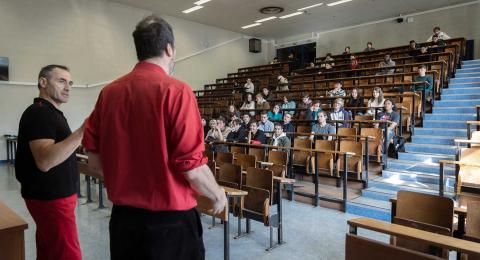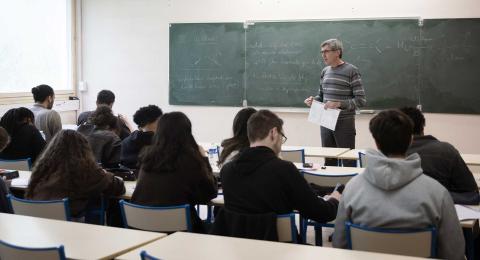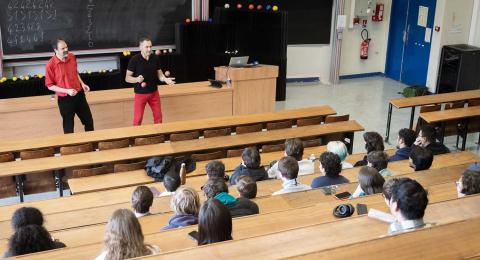The Master Program AWCS (SAR) is a research-oriented Master degree, that corresponds to the second year of the 2-year European Master degree curriculum. conducted entirely in English, this program provides a rigorous foundation in wireless communications, machine learning, and networking. Its primary goal is to equip students with the deep theoretical knowledge and practical skills required for a successful career in research and development.
The curriculum provides a wide-ranging education, spanning the disciplines of information theory, coding, communication and networking theory, and machine learning—with a focus on statistical learning, reinforcement learning, deep learning, and large language models (LLMs). The instructors are internationally-renowned researchers in their field. The curriculum is structured in three progressive phases: a Foundational Core of fundamental courses, a Research Immersion involving advanced seminars and a hands-on project, and a culminating Internship with an industrial or academic partner, either in France or abroad.
Information
Skills
Courses focus on the theoretical and fundamental methodologies and techniques, which are necessary for understanding key advances in the areas of wireless communications, machine learning and networking.
The career of M2R SAR graduates could be oriented towards all sectors of telecommunications and machine learning. They could work in higher education institutions and universities, in public (CNRS, INRIA, CEA, etc.) and private research sector (industrial research and development departments) and in any company requiring deep understanding and rigorous scientific reasoning (project managers, research directors, etc.). A survey about the first employment of former students has shown that they find very shortly after their graduation either funding for pursuing a PhD thesis (CIFRE, doctoral contracts, public grants and scholarships) or a permanent position in a company
The M2 SAR has an extended network of industrial partners, including Nokia, Ericsson, Orange Labs, Qualcomm, Thales Communications, TCL, EDF, CEA, Mitsubishi Electric, SEQUANS Communications, etc. Many students join the above companies for their research internship.
Objectives
This cross-disciplinary program aims to convey solid fundamental knowledge in the field of wireless communications, machine learning, and networking as a means to prepare the students for their future professional careers. The curriculum spans a large spectrum of material, ranging from information theory and coding to communication theory, networking theory and machine learning (statistical and reinforcement learning, Deep learning, LLM).
The academic year is structured as follows:
- September - February: The academic year begins with foundational courses, where students build a strong background in essential mathematical tools and machine learning. This foundation supports subsequent specialized courses in wireless communication and networking, which provide the key concepts needed for advanced research.
-January - March: the focus shifts to research immersion. Students participate in seminars on advanced topics and begin developing their own research project.
- Finally, from April onward, students undertake a full-time internship for a at least four months, in companies or academic institutions, either in France or internationally.
Career Opportunities
Career prospects
Après un Master ou Master + Doctorat : chercheur ou enseignant-chercheur
Ingenieur R&D
ingénieur étude conception
Consultant
Ingénieur d’études dans les domaines de l’industrie
Ingénieur d’études dans les domaines de la recherche
Ingénieur d'études industrie / recherche publique
Enseignants-chercheurs
Further Study Opportunities
Doctorat
domaines de l’apprentissage statistique, de l’intelligence artificielle ou de l’analyse de données avancée
Ingénierie études, recherche et développement
Les étudiants de cette mention peuvent se tourner vers la recherche à l’issue du M2
Les étudiants titulaires d’un M2 ont la possibilité de poursuivre dans la recherche en doctorat
Fees and scholarships
The amounts may vary depending on the programme and your personal circumstances.
Admission Route
Capacity
Available Places
Target Audience and Entry Requirements
-Students having an M1 (i.e. first year of the two-year European Master degree curriculum) in Electrical Engineering and related fields (e.g. Telecommunications, Electronics, etc.).
-Students having an M1 in mathematics, Physics, or Computer Science
-Students having a Bachelor of Engineering (BE) in Electrical Engineering and related field.
-Engineering students can attend this master program in parallel to the last year of their engineering curriculum
Application Period(s)
From 21/01/2026 to 30/06/2026
Supporting documents
Compulsory supporting documents
Motivation letter.
Letter of recommendation or internship evaluation.
All transcripts of the years / semesters validated since the high school diploma at the date of application.
Curriculum Vitae.
Detailed description and hourly volume of courses taken since the beginning of the university program.
Additional supporting documents
Certificate of English level (compulsory for non-English speakers).
VAP file (obligatory for all persons requesting a valuation of the assets to enter the diploma).
Document indicating the list of local M2 choices available here : https://urlz.fr/i3Lo.
Supporting documents :
- Residence permit stating the country of residence of the first country
- Or receipt of request stating the country of first asylum
- Or document from the UNHCR granting refugee status
- Or receipt of refugee status request delivered in France
- Or residence permit stating the refugee status delivered in France
- Or document stating subsidiary protection in France or abroad
- Or document stating temporary protection in France or abroad.
| Subjects | ECTS | Semestre | Lecture | directed study | practical class | Lecture/directed study | Lecture/practical class | directed study/practical class | distance-learning course | Project | Supervised studies |
|---|---|---|---|---|---|---|---|---|---|---|---|
| Foundations of Deep Learning | Semestre 1 | ||||||||||
| Statistical and Reinforcement Learning | Semestre 1 | ||||||||||
| Mathematical Basis for Communication and Learning | Semestre 1 | ||||||||||
| Subjects | ECTS | Semestre | Lecture | directed study | practical class | Lecture/directed study | Lecture/practical class | directed study/practical class | distance-learning course | Project | Supervised studies |
|---|---|---|---|---|---|---|---|---|---|---|---|
| Network Architectures and Performance | Semestre 1 | ||||||||||
| Foundations of Wireless Communications | Semestre 1 | ||||||||||
| Information and Coding Theory | Semestre 1 | ||||||||||
| Subjects | ECTS | Semestre | Lecture | directed study | practical class | Lecture/directed study | Lecture/practical class | directed study/practical class | distance-learning course | Project | Supervised studies |
|---|---|---|---|---|---|---|---|---|---|---|---|
| Internship | Semestre 2 | ||||||||||
| Subjects | ECTS | Semestre | Lecture | directed study | practical class | Lecture/directed study | Lecture/practical class | directed study/practical class | distance-learning course | Project | Supervised studies |
|---|---|---|---|---|---|---|---|---|---|---|---|
| Research Project | Semestre 2 | ||||||||||
| Subjects | ECTS | Semestre | Lecture | directed study | practical class | Lecture/directed study | Lecture/practical class | directed study/practical class | distance-learning course | Project | Supervised studies |
|---|---|---|---|---|---|---|---|---|---|---|---|
| UE libre | Semestre 2 | 12 | |||||||||
| Multimedia Compression | Semestre 2 | 12 | |||||||||
| Satellite Communications | Semestre 2 | 12 | |||||||||
| Introduction to 6G | Semestre 2 | 12 | |||||||||
| Large Language Models (LLM) in Communication and Networking | Semestre 2 | 12 | |||||||||
| Quantum Information Theory | Semestre 2 | 12 | |||||||||
| Reconfigurable Intelligent Metasurfaces | Semestre 2 | 12 | |||||||||









